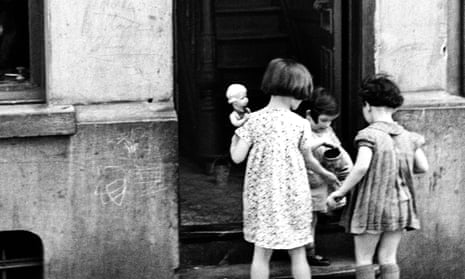“You’re different,” Will’s wife-to-be, Yvette, tells him. “You’re not like any of us. What I mean is, you come across as a survivor.” It is 1941, Antwerp is under Nazi occupation, and Wilfried Wils, an aspiring poet trying to earn a living, is a new recruit to the city’s police force, alongside his future brother-in-law, Lode. Much to their discomfort, the two men must assist one evening as German military police evict a Jewish family. When a child is injured, it is too much for Lode, and in the ensuing struggle, Will also ends up grappling with one of the Germans.
Back at the station Lode files a complaint against the Nazis, reckless of the consequences, but Will’s instinct for self-preservation kicks in. Playing “the reasonable one” to the duty sergeant, Will ensures no complaint is lodged, and moreover that the record of his own actions is sufficiently blurred – was he protecting a Jewish child or only stopping a fight between policemen? It is a smart move but chilly in its calculation; Will covers his own back even as Lode’s is left potentially exposed. It’s only the first indication of where Nazi rule may lead Will.
Flemish author Jeroen Olyslaegers’ great strength here is to look into dark times and find ever darker corners to show his readers, revealing the doublethink and double dealing that occupation gives rise to. The mayor orders a police guard at every synagogue, even while other officers turn Antwerp’s Jews out of their homes. Will’s Aunt Emma, a long-serving maid to a Jewish family, stays on in their requisitioned house with her new lover, an SS officer. “Everyone’s inner self is revealed. It’s like a striptease …” Lode’s family hide a Jewish man, but only on the promise of future payment – would they risk this were he not a diamond merchant? Will sneaks food to him, but also maintains a friendship with a former tutor, “Meanbeard”, a Flemish Nazi. When Will was a schoolboy, Meanbeard introduced him to Rimbaud; now he opens out his political circle. Straddling these two worlds is surely impossible; betrayal – perhaps even of both sides – becomes inevitable.
The events of the war years are narrated in old age to an unnamed great-grandson; a mea culpa in which Will, now a widower, frail and rejected by his family, seeks not so much to explain but to elaborate on his wartime actions. “There’s a bastard inside every follower … Participation is only a stone’s throw away.” According to the publisher,Will is “a man trying to survive among the treachery”, and this novel “asks what any of us would do” in such circumstances. It is a vital and endlessly frightening question: under the cosh of an occupier, who among us would actually risk our lives or livelihoods for the sake of principle, or a fellow citizen?
But Will is no everyman for the reader to journey with into darkness, relatable enough that we recognise ourselves in his attempts to square his moral circles. Yvette is right, he is indeed different: a singular and rather cauterised person. His father a “mean drunk”, his mother browbeaten and wheedling, Will’s inner bastard revealed himself early in unhappy boyhood, when a bout of meningitis left him hospitalised and hallucinating his poetic alter ego, the wryly named Angelo. He is emotionally distant from both parents and friends, and even his love story with Yvette, while strikingly erotic, is less a meeting of souls than a battle of sexual conquest, waged from both sides. Will’s Antwerp is a city in which no one loves or acts out of fellow feeling, and where few struggle with their consciences for any longer than it takes to empty their victims’ pockets. Everyone has a price, so the saying goes, but in this novel characters are so easily and frequently bought the idea quickly loses its shock.
It is Will’s inner darkness that drives this book, and it lends a ferocious energy to the narration. He is a Cassandra, cursed to speak harsh truths about humanity’s essential baseness: “Oh my grotesque poet’s heart!” Like Cassandra, Will finds few with the stomach to listen, or to read his poetry. He describes human history as “a stream of filth, bastardry that never stops, not really”. The occupation was just a more extreme version of what he sees everywhere, at all times, and in all of us: cowardice, greed, self-interest. Will’s moral world has few shades of grey; mostly he shows us varying depths of black, each growing darker than the last, all the way to the closing pages. Olyslaegers seems intent on pulling the scales from our eyes, and if he offers a vision without hope, it is also a vision pursued with rigour.
